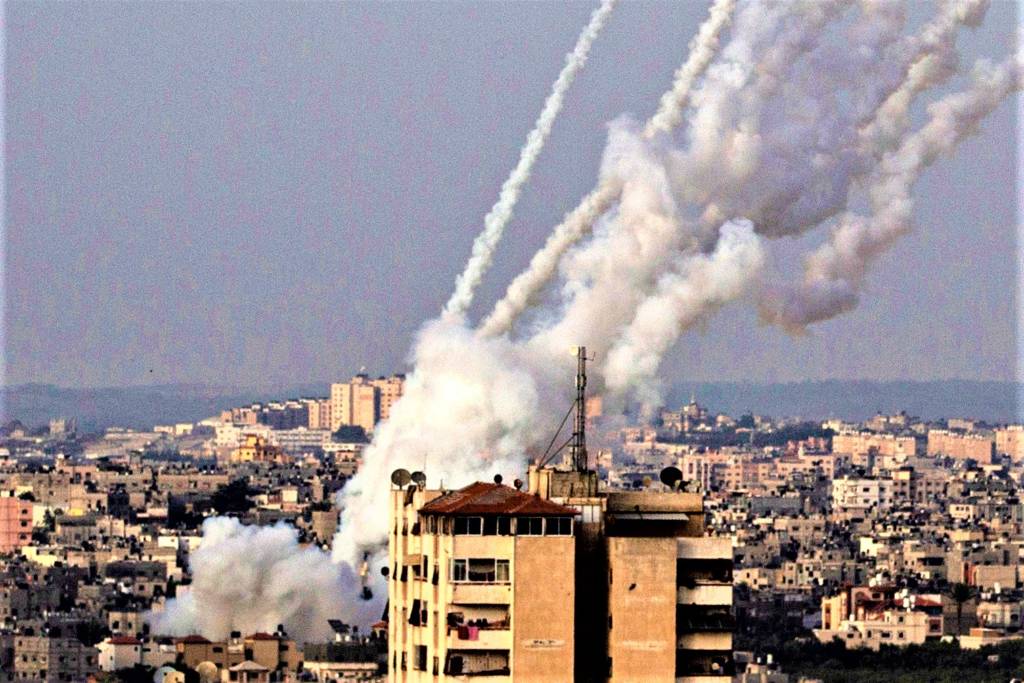“A significant portion of their long-range rocket arsenal has likely been depleted,” said the Le Beck report, published Tuesday.
By Sharon Wrobel, The Algemeiner
The Hamas terror group and Palestinian Islamic Jihad (PIJ) still have enough rockets and fighters to wage additional week-long or even months-long conflicts following the recent hostilities with Israel, according to an assessment by Le Beck, a Middle East-based geopolitical and security consultancy.
“The Israeli operation did not critically cripple Hamas nor PIJ (nor was it meant to) … while both can still fire shorter-range rockets for weeks (if not months), a significant portion of their long-range rocket arsenal has likely been depleted,” according to the Le Beck report, published Tuesday, on the key lessons from the May conflict.
“Hamas and PIJ still have around two-third of the total number of rockets they had at the start of the Israeli operation,” Michael Horowitz, Head of Intelligence at Le Beck, told The Algemeiner. “This means that they may still have up to 17,000 rockets between the both of them, when compared to the 4,350 rockets that were fired during the 11-day conflict.”
“This is not to say that their capabilities to fire or produce rockets haven’t been degraded,” commented Horowitz. “Their missile-production capabilities have been the focus of multiple strikes and they have also fired most of their longer-range rockets. Our assessment is that they fired between 600 to 900 longer-range rockets [more than 40 kilometers].”
Additionally, Hamas fired rockets at a far greater rate during Operation Guardian of the Walls — which was four times that of the 2014 Gaza war, also known as Operation Protective Edge — and twice that of the 2012 Pillar of Defense operation, according to the report’s assessment.
“Hamas also used its longest-range rocket to date. While this is notable development, the lack of precision-guidance, or any effort to improve rocket accuracy, means such rockets are unlikely to have any sort of military result, other than the psychological impact on the Israeli home front,” read one of the conclusions in the report.
Le Beck security analysts deemed Hamas’s attempts to “surprise” the Israeli army during last month’s fighting with the deployment of new Iranian inspired drones, or the use of an unmanned underwater vehicle as “largely ineffective.”
“These capabilities are still in development, but similarly to the unguided rockets, could become more of a nuisance should they be produced in greater quantities, or be further improved,” the report said.
During the last operation, one of Israel’s main targets was to harm Hamas’s defensive infrastructure by damaging the underground tunnel system in the Gaza Strip. The complex tunnel system is used by the terrorist group to move rockets and operatives from one area to another and to launch attacks.
“If the Israeli military did indeed destroy around 20% of the Metro [tunnel] network, particularly in Gaza city and northern Gaza, Hamas will indeed be more vulnerable to pressure for another year and a half at least,” according to Le Beck’s assessment.
The security consultancy identified at least 86 terrorists in Gaza, including 13 Hamas and PIJ senior members, who were targeted and killed by the Israeli army.
“The targeted assassinations may have disrupted some of the group’s capabilities, particularly the ‘surprises’ Hamas claimed it would use, but the core of the group’s fighting capabilities (rocket launches) was affected in a far more limited way,” according to the report. “The targeted assassinations of R&D/production officials, in addition to continued strikes against the groups’ rocket-production capabilities will delay their ability to replenish their arsenal, yet won’t prevent them from doing so.”
For Hamas, the recent conflict’s “measure of success” on a strategic level is a function of how much support it gained on its home turf in general, and in Judea and Samaria in particular.
“There are already signs that Hamas became more popular amongst West Bank Palestinians than it was before, although it still too early to draw any definitive conclusions. The group will continue to try and gain a broader foothold in the West Bank, regardless of the situation in Gaza,” the report assessed.
Meanwhile, Israel’s strategic objective was to restore deterrence and therefore the country’s “measure of success” will be determined by how long it takes for the next Gaza conflict to evolve.
With this in mind, the security consultancy commended the Israeli military for its “significant” improvements in the use of new technologies to quickly detect threats, spot rocket launchers, and warn map out militant capabilities.
“These improvements stem from several key new intelligence programs that will prove critical in future wars,” the report said.
MAKE THE LAND OF ISRAEL EVEN MORE BEAUTIFUL!
PLANT YOUR VERY OWN FRUIT TREES IN ISRAEL!
Farmers near the Gaza border lost family, friends and workers. Spring is here, and they desperately need help to replant the farms. Join us in blessing the People and Land of Israel.
“I will ordain My blessing for you…” (Leviticus 25:4)
